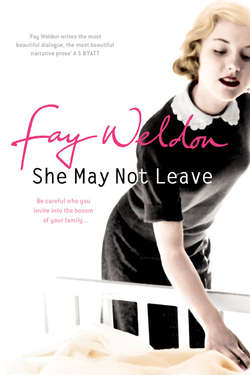Читать книгу She May Not Leave - Fay Weldon - Страница 9
A Further Ethical Discussion After Supper
Оглавление‘With your Swedish background,’ says Martyn to Hattie, ‘I am surprised you take the view you do.’ He will not let up. He is no longer hungry but he is unsatisfied, and deprived of sensual pleasures. Baby Kitty still sleeps in a cot next to their bed. Martyn can see the sense of it, but wishes the baby slept in a separate room. Sometimes he wakes in the night and reaches out for his wife, which seems his natural right, and finds Hattie sitting up and feeding Kitty. (He knows she is not his wife but his partner, and thus ‘natural right’ is the more questionable: it is one of the subliminal reasons why he would marry her if he could.)
Hattie will look at the child with what Martyn hopes is adoration, but suspects it is something more like amazement. She feels uneasy about making love while dripping milk from her breasts. For someone who rather dislikes the thought of breast-feeding – so cowlike – she produces a remarkable amount of this sweetish, delicately scented liquid from her nipples. Martyn, too, is amazed. It puts him in mind of a film he saw as a child about the exploitation of workers in the Malaysian rubber plantations. Cuts were made in bark and a strange yellowish goo would seep out. He was revolted. He knows breast-feeding is natural and right but he wishes Kitty fed from a bottle. He preferred it when Hattie’s breasts were erotic signifiers rather than dedicated to feeding another, even though that other has sprung from his seed. Indeed, Martyn finds the processes of parturition so bizarre as to be almost beyond belief.
Since the birth, he, who was once so scientifically reluctant and talked about Nature in the same way as people once talked about God – as the source of all goodness – finds himself all for cloning, test tubes, stem cell research, artificial wombs, GM crops and the like. The further from Nature and the more subject to intelligence and contrivance, the better. It has crossed his mind that an au pair would take up the spare room, and that this postpones the baby having a room of its own, and makes the likelihood of any decent, noisy, bounce-around-the-house sex even more remote than before.
‘What has my Swedish father got to do with anything?’ asks Hattie. Martyn points out that a Swedish Prime Minister’s wife, a full-time working lawyer, was lately in trouble for employing a maid to clean their house. That she should do so was seen as demeaning to her, her husband and the maid. In Sweden, people are expected to clean up after themselves.
‘Now we, who are meant to be working for the New Jerusalem, are to have a servant?’ Martyn asks, ‘Where are our principles?’
Hattie almost giggles. Sometimes she thinks he is addressing a public meeting, not her, but he has a future as a politician so she forgives him: he has to get into practice.
‘She’s not a servant,’ says Hattie, firmly. ‘She is an au pair.
Or a nanny. I don’t know which she will prefer to be called.’ ‘Whatever – she will be doing our dirty work because we can afford to have her do it, and she can’t afford not to do it,’ says Martyn. ‘What’s that if not a servant? Get real, Hattie. By all means do what’s convenient, but understand what you’re doing.’
‘We are embarking on a fair and sensible division of labour,’ says Hattie haughtily, seeing that mirth will not distract him.
‘Have you thought about the consequences of being an employer?’ Martyn asks. ‘Are we doing it officially, paying for insurance stamps, taking tax at source and so on? I certainly hope so.’
‘If she’s working part-time and lives in, she doesn’t need stamps,’ says Hattie. ‘She counts as one of the family. I asked Babs.’
‘I assume you’ve seen her visa, and she’s entitled to be in this country?’
‘Agnieszka doesn’t need a visa. She’s from Poland,’ says Hattie. ‘We’re all Europeans now. We must be hospitable and do everything we can to make her welcome. It’s all rather exciting.’
She has a vague idea of Agnieszka as a simple farm girl, from a backward country, with a poor education, but welltrained by her mother in the traditional domestic arts. Hattie will be able to teach her, and enlighten her, and show her how forward-thinking people live.
‘I wouldn’t be too sure,’ says Martyn. ‘She’ll probably hate it here and leave within the week anyway.’
Both come from long lines of arguers and defenders of principle in the face of all opposition.
